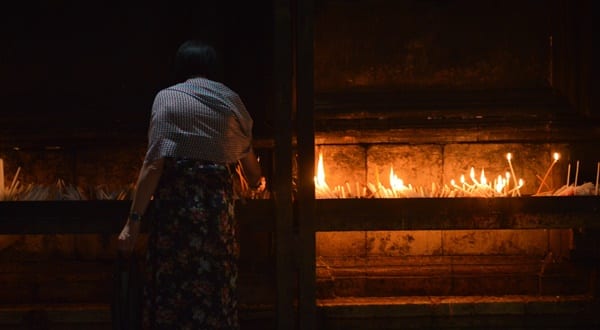
It’s been a few days since the tragic murder of three young Muslims in Chapel Hill, North Carolina. The lives of Deah Shaddy Barakat, Yosor Muhammad, and Razan Razan Mohammad Abu-Selha were cut short. They were murdered, shot in the head, by Craig Hicks.
Hicks is an avowed atheist. Prominently displayed on his Facebook page is a meme that claims,
Of course I want religion to go away. I don’t deny you your right to believe whatever you’d like; but I have the right to point out it’s ignorant and dangerous for as long as your baseless superstitions keep killing people.
“As long as your baseless superstitions keep killing people.” The tragic irony of that meme is palpable. You may be surprised to know that, as a Christian, I greatly appreciate atheism’s critique of religious violence. Religion should be critiqued whenever it is used as a justification for violence.
But atheism can be very religious in its violence. At its core, religious violence unites adherents in the faith that violence can solve our problems. In other words, many religious people don’t actually have faith in God; they have faith in violence.
Hicks reveals something crucially important about atheism. Do not be fooled by the term “atheism.” Like many religious people, many atheists have the same idolatrous faith in a violent god that justifies their violence.
The religion of violence creates a spirit of hatred and accusations. Notice how the blame game started very quickly after the horrendous murders. Religious people used Hicks as a justification to accuse atheists of violence. Atheists then doubled down and accused religion of “divinely sanctioned violence.” These mutual accusations against one another are themselves violent and only provide further evidence that each side worships at the throne of violence.
Blaming another for violence is a convenient way of projecting our own violent tendencies upon someone else. Religious people and atheists begin to mirror one another in our accusations: “We aren’t violent. We are the good guys. We are for peace. They are the violent ones. If we could just get rid of their violent belief system, the world would be a much better place.”
There is only one way out of the trap of the violent religion that unites us against one another. Aleksandr Solzhenitsyn summed it up best when he said,
If only there were evil people somewhere insidiously committing evil deeds, and it were necessary only to separate them from the rest of us and destroy them. But the line dividing good and evil cuts through the heart of every human being. And who is willing to destroy a piece of his own heart?
The evil that cuts through their hearts is the evil that cuts through our hearts. Religious people and atheists can now unite in our condemnation of Hicks as an evil man. That’s far too easy. The fact is that Hicks is much more like us than we’d like to admit. He is a product of our cultural worship of hatred and violence.
And so, by condemning Hicks for violence, we condemn ourselves because the hatred and violence that runs through him also runs through us.
The solution to our cultural worship of violence is to stop blaming someone else for it and start taking responsibility for our own violent impulses.
The greatest problem facing the world today isn’t atheists or Christians or Muslims. Our greatest problem is the violence that infects us all. Religious violence, secular violence, economic violence, emotional violence, and spiritual violence threaten to destroy our communities. Why? Because we can’t control violence; violence controls us.
The best alternative to violence is nonviolence. The Qur’an’s nonviolent teachings should be highlighted in this conversation. For example, the Qur’an explains that “Good and evil cannot be equal. Repel evil with what is better and your enemy will become as close as an old and valued friend.”
If we want to blame anything, then blame violence. But let’s not primarily condemn the violence “out there.” Let’s take personal responsibility to stop worshiping at the throne of violence. Let’s take responsibility for the violence that exists within ourselves. And let’s start taking responsibility to repel evil with what is better by loving our neighbors, including those we call our enemies, as we love ourselves.











